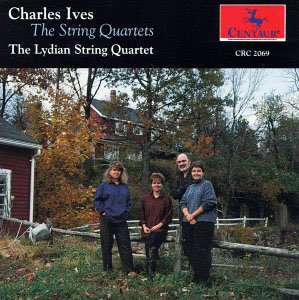Ives’ two string quartets are strikingly different,
even though both bear the composer’s remarkable stamp of originality.
Ives wrote the First String Quartet during his sophomore year
at Yale University. It was his first major multi-movement work.
Each movements is based an organ composition that Ives had written
as a church organist. (Unfortunately, these works are now lost.)
Characteristically, Ives also quotes many familiar hymn tunes,
and weaves them into the fabric of his composition. Since the
work is steeped in such religious feeling, the subtitle of the
work is From the Salvation Army.
In the First String Quartet, the Lydian players
are appropriately grave and reverential. In the second movement,
they are jaunty and dance-like. The third movement, titled Offertory,
is very tender, and the Lydian String Quartet plays with a gentle,
luminous tone. The final movement is also convincing, with a stirring
finale. However, the overall impression is one of delicacy, with
an almost nostalgic quality. Compared to other recorded versions
of this work, the Lydian Quartet’s tone is especially gentle.
The Concord String Quartet offers an interesting contrast. Their
reading brings much more vitality and joy in the work. Ultimately,
I find their reading to be more convincing. But the Concord Quartet’s
recording, only available on LP, is long out of print (Nonesuch
H-71306). Regardless, the Lydian Quartet reading is very fine,
if a bit different.
The Second String Quartet dates from Ives’ peak
years. Ives regarded the work as one of his best compositions.
Unlike the First String Quartet, which is largely a traditional,
tonal work, the Second String Quartet is one of Ives’ thorniest,
most difficult works, with significant atonal passages. Ives describes
the program of the work:
S[tring] Q[uartet] for 4 men--who converse,
discuss, argue (in re: 'Politick', fight, shake hands, shut
up--then walk up the mountain side to view the firmament!
The work represents Ives’ disgust with the conservative
classical music establishment, and its unwillingness to vary from
traditional, narrowly defined notions of beauty. As such, this
is certainly one of Ives’ most confrontational works.
From its mysterious opening passage, the Second
String Quartet comes from a different sound world. The Lydian
players are especially haunting in the first movement, "Discussions."
The second movement, "Arguments," is exaggeratedly sweet
and then crunchingly dissonant by turns. In fact, I would have
preferred to hear an even more confrontational quality from the
Lydian Quartet here. The Juilliard String Quartet, for example,
is much more fierce, even hallucinatory, on their recently re-issued
Sony recording (UK Sony Essential Classics 87967). The work reaches
its apotheosis in the third movement, "The Call of the Mountains."
The Lydian Quartet’s reading of this movement is exceptional.
The pacing is excellent, and the highlight of the disc is the
cosmic finale where Ives manages to unify all of the competing
"characters" as they gaze up at the heavens.
The other works—"Hymn" and "Hallowe’en"—are
equally well performed. Throughout the entire disc, the sound
quality is fine, with a natural, slightly reverberant, "in
the room" quality.
These performances by the Lydian String Quartet
are impressive. While I wouldn’t want to be without other versions
of these works—notably the recordings by the Juilliard and Concord
string quartets—this disc would make a fine addition to anyone’s
collection. Recommended.
Scott Mortensen
View Scott Mortensen’s Charles
Ives web site on MusicWeb
